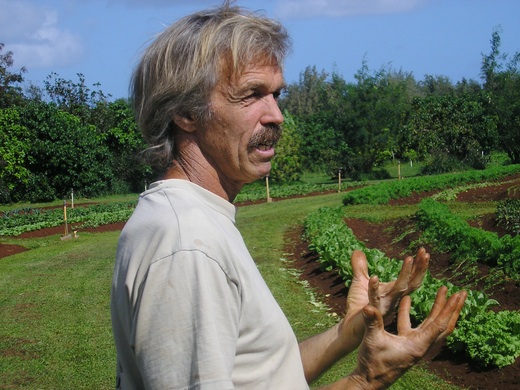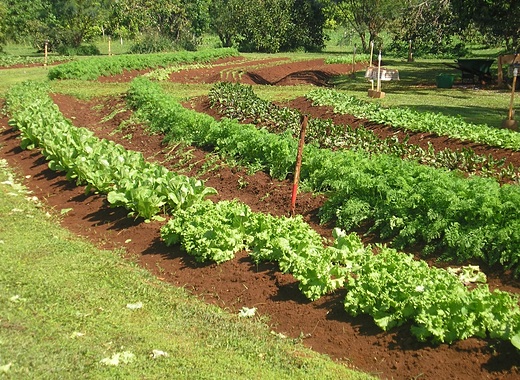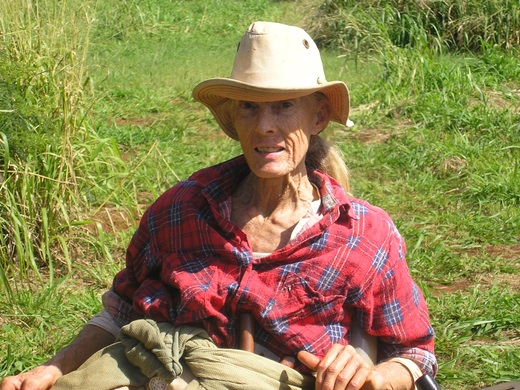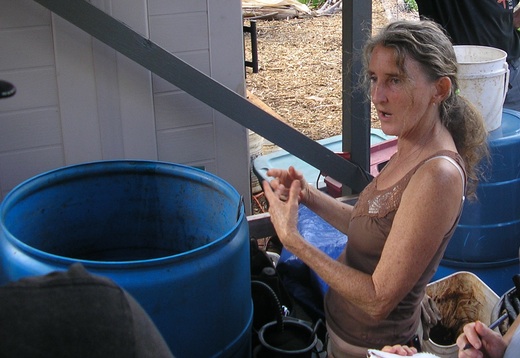By Linda Pascatore on 18 January 2009 for Island Breath -
(http://islandbreath.blogspot.com/2009/01/kauai-organic-farm-tour.html)

Image above: Scott explains weeding process "Every inch, Every week, Everywhere". All photos by Juan Wilson
I recently enrolled in the Growing Food Seminar, a Gardening Class at Kauai Community College. The lead instructor is Glenn Hontz, but the class will actually be taught by many local gardening specialists. The purpose of this class, and the other gardening classes offered, is to promote sustainable food production on Kauai. This is a committed group of people who are working hard to achieve eventual food sovereignty; locally growing all we need to survive.
The current class is a continuation of the Seminar offered last semester, and many of those students have returned to participate in the class as a continuing series. A group of them organized a class field trip this past Saturday to visit some local organic gardens.
NECTAR GARDENS
Our first stop was Nectar Gardens, run by Scott Pomeroy in Moloaa. He was farming 15 acres of a beautiful, well organized gardens and orchards. Scott has been commercially gardening here on Kauai for many years. He currently sells most of his produce at local farmer's markets, but in the past has done CSA's (Community Supported Agriculture), sales to local restaurants, and even exporting to Oahu.
Scott uses frequent plantings of cover crops to enrich his soil. They fix nitrogen and add organic material. Some of his favorite cover crops are cowpeas, sudan grass, and buckwheat. He also rotates crops and even moves gardening areas to let the soil recover from depletion of nutrients caused by intensively growing food crops.
Scott's main vegetable gardening area is an array of beautiful curved rows. He weeds weekly, before the weeds have time to get established. A sprinkler system is used for watering. Scott recently bought a tiller which pushes soil from the paths into raised beds for planting.

Image above: Rows of perfect produce for next week.
The vegetable garden area is protected by a windbreak of a variety of trees. Scott has planted some hardwoods for later harvest, and nitrogen fixing trees. He also has many fruit bearing trees planted close enough together so that little mowing or maintenance is required once the trees mature. He has just fenced in an area which will produce sweet potatoes, taro, and cassava; all crops that have to be protected from wild pigs.
Scott is currently teaching another KCC course, Learning the Skills of Organic Gardening, at his farm. Scott has also taught at UC Santa Cruz, and recently at Waipa Garden Project. You can buy Nectar Garden produce at the farmer's markets at Hanalei and Kilauea.
SPIRIT OF THE EARTH FARM
Our next stop on the garden tour was Spirit of the Earth Farm, owned by Marie Mauger. Marie gardens according to the principals of Biodynamic Farming. According to Wikipedia, Biodynamics is a method of organic farming that has its basis in a spiritual world-view first propounded by Rudolf Steiner. He saw farms as unified and individual organisms. There is an emphasis on balancing the holistic development and interrelationship of the soil, plants, and animals as a closed, self-nourishing system. Manures, composts, fermented herbal and mineral preparations are used to energize the soil. An astronomically based planting calendar is also employed.

Image above: Marie introducing biodynamics tour.
Marie led us on a tour of her site, which was in a very natural state, more like permaculture than farming. There was one large field, the Peace Garden, where most of the vegetables were grown. I can personally vouch for the quality of Marie's produce. For several years, I participated in a CSA and received a weekly share of her produce. She always provided superb greens and herbs.
Marie gives classes in Biodynamic farming and gardening. She also is available to come to your site and make raised beds with her new tilling machine, which is the same one Scott used. Marie can be contacted at mariemauger@yahoo.com

Image above: small pond near Peace Garden.
MOONFRUIT ORCHARD
The last garden we visited was on a farm called Moonfruit Orchard, a 4+ acre orchard and nursery of dwarf coconut trees. Their intensive garden zone is a soil restoration project untilizing sustainable, no-till natural processes such as vermiculture (growing worms), sheet mulching, cover cropping, reforestation, and compost tea application. This endeavor is designed and implemented by WormsWork, a vermiculture/soil remediation cooperative.
Cristal guided us through this permaculture enterprise, where they are making great soil by growing worms. They are taking a variety of waste materials such as wood chips, paper scraps, cardboard and garbage to make what she called "forest-compost" piles. These piles mimic processes that occur naturally on the forest floor (rather than the more commonly-used "hot-compost"piles). These are worm incubators. The worm castings are the stuff of "Black Gold", the basis of nutrient-rich soil.
Cristal pointed out that what our soil on Kauai needs more than anything is carbon (i.e. browns: mulch, cardboard, tree chips, dead leaves, sticks, logs, branches, etc). The only way to have healthy soil is to have enough carbon to continuously feed it. To do that, we need forests everywhere possible. A healthy tropical forest stores nutrients primarily in the canopy layers because everything on the ground is continuously composting. Sustainability in the tropics equals forests.
We saw different stages of the process of making a productive garden, using the permaculture principle--"Most effect for least effort". Cardboard was laid over cut fields of guinea grass (nitrogen) which had originally covered the property twelve feet high. Then wood chips were mixed with mulch (nitrogen), to cover the cardboard (which together make a 6-12" carbon layer). The next step was to plant pumpkins, whose roots provide a perfect habitat for composting microorganisms to flourish.

Image above: Cristal demonstrates "worm tea". Photo by Juan Wilson
There were also compost beds which serve as worm factories. Compost was layered and managed to provide just the right environment for worms to thrive. Cristal was growing both blue and red worms. She invited our gardening class to dig around and find some worms, and we did!
When the worms are done breaking down the garbage in an area, the result is worm castings. This is beautifully rich and dark soil, which is added to the areas already prepared by the mulching and pumpkins, to build garden soil. The final stage was a vegetable garden, a lovely array of raised beds with a variety of produce. Crystal also makes a compost "tea" from the castings, used as liquid fertilizer.

Image above: Tour visits worm refuge in banana grove. Photo by Juan Wilson
There were also compost beds which serve as worm factories. Compost was layered and managed to provide just the right environment for worms to thrive. Cristal was growing both blue and red worms. She invited our gardening class to dig around and find some worms, and we did!
When the worms are done breaking down the garbage in an area, the result is worm castings. This is beautifully rich and dark soil, which is added to the areas already prepared by the mulching and pumpkins, to build garden soil. The final stage was a vegetable garden, a lovely array of raised beds with a variety of produce. Crystal also makes a compost "tea" from the castings, used as liquid fertilizer.

Image above: Tour visits worm refuge in banana grove. Photo by Juan Wilson
Cristal and team offer classes to teach vermiculture, compost and reforestation methods. WormsWork Cooperative sells worms (actually compost start-up colonies), and also offer on-site design and consultation for homes, schools, businesses and farms. They can help install basic perennial food/forest/gardens including staple foods with supportive closed-loop systems such as companion plants, vermicompost and water design. You can learn more at vermiculturekauai.pbwiki.com, or contact Cristal at wormsworkkauai@gmail.com
The garden tour was set to continue on to one more site in Kapaa. However, I confess that a I cut out of the last tour and headed home. I did really enjoy being outdoors, meeting these master gardeners, and seeing the principles of organic gardening in action.
KCC is offering several different gardening classes. They include my Growing Food class, the on-site organic gardening at Scott's, an ongoing hands on class at the KCC garden, and a class on the business end of the process. You can learn more about gardening classes at KCC by contacting Glenn Hontz at 246-4859 or emailing him at hontz@hawaii.edu. A group of gardeners from the Growing Food class also maintains a google group with helpful gardening info at: http://groups.google.com/group/koloadistrictgardeners?lnk=srg
3 comments :
What a great review of the garden tour we took. Thanks so much for taking the time to write such an outstanding review.
Neil Brosnahan, Kaloa District Gardeners
Thanks so much Linda. This brings back all the delights of that day. I wish it were shorter. Some of us left Karen's before she was finished because we just couldn't stand up any more. I understand the tour actually took over SEVEN hours! I am going to send this on to interested friends. Pictures are worth so much more than words.
Aloha,
Ellie
I enjoyed reading your blog ~ thanks for posting such useful content./Nice article and great photos. Very nicely done!
Organic Gardens
Post a Comment